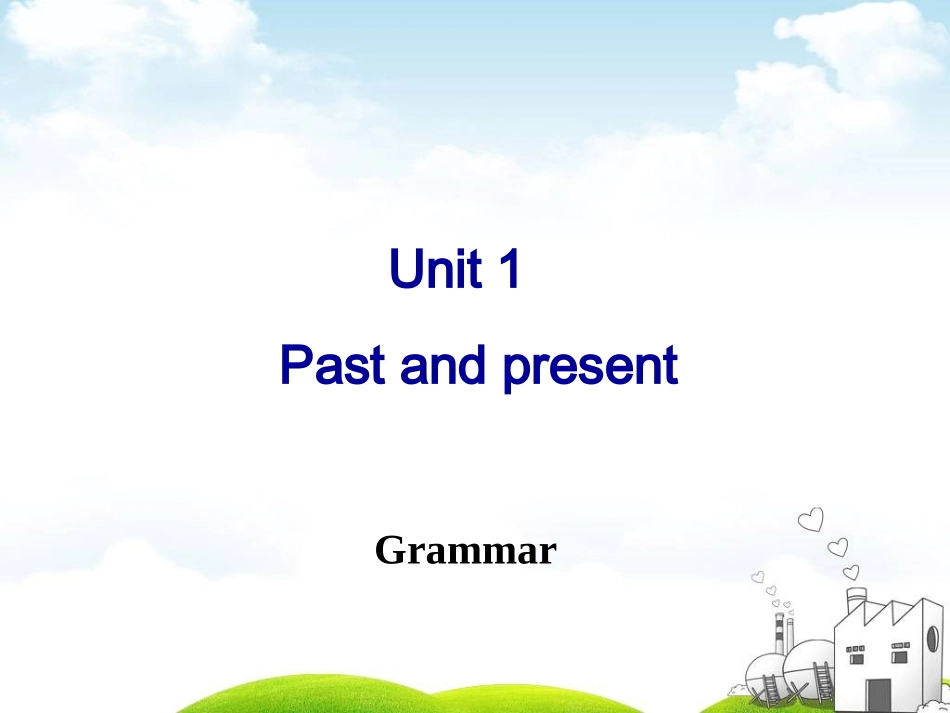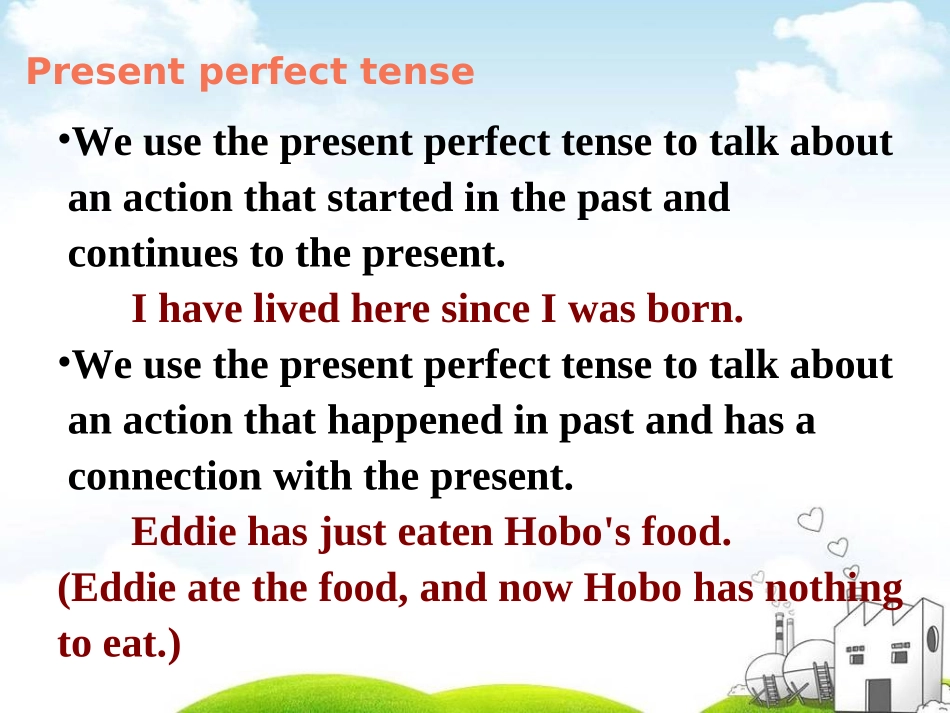Unit1PastandpresentGrammarPresentperfecttense•Weusethepresentperfecttensetotalkaboutanactionthatstartedinthepastandcontinuestothepresent.IhavelivedheresinceIwasborn.•Weusethepresentperfecttensetotalkaboutanactionthathappenedinpastandhasaconnectionwiththepresent.EddiehasjusteatenHobo'sfood.(Eddieatethefood,andnowHobohasnothingtoeat.)•Wealsousethepresentperfecttensetotalkabouthowmanytimesanactionhashappenedtillnow.Ihavealreadyreadthisbookmanytimes.Wecanusethesetimeexpressionswiththepresentperfecttense.alreadyyeteverneverJustrecentlysinceforTipWemakepositivestatementsinthepresentperfecttenselikethis:I/You/We/Theyhavearrived.He/She/IthasWemakenegativestatementsinthepresentperfecttenselikethis:I/You/We/Theyhavearrived.He/She/Ithasnothavenot=haven’thasnot=hasn’tTipWeaskandanswerquestionsusingthepresentperfecttenselikethis:HaveI/you/we/theyarrived?Hashe/she/itYes,I/you/we/theyhavehe/she/ithasNo,I/you/we/theyhaven’t.he/she/ithasn’tMostverbs+edfinishfinishedVerbsendingin-e+dchangechangedVerbsendinginaconsonant+y-y+iedcarrycarriedShortverbsendinginavowel+aconsonantDoubletheconsonant+edstopstoppedWeformthepastparticiplesofregularverbsbyadding-ed,justaswhatwedotoformthesimplepasttenseoftheseverbs.NochangecomecomehurthurtChangethevowelholdheldwinwonChangetheconsonantlendlentbuildbuiltChangethevowel(s)andtheconsonant(s)catchcaughtkeepkeptforgetforgottentelltoldothersbebeenhavehadfallfallenflyflowndrawdrawnseeseenWeformthepastparticiplesofirregularverbsdifferently.Herearesomeexamples.Thetablebelowshowsmoreexamplesofthepastparticiplesofverbs.RegularverbsIrregularverbsBaseformPastparticipleBaseformPastparticiplevisitrepairlivemovetrystudyfitplanvisitedrepairedlivedmovedtriedstudiedfittedplannedhitputmeetmakesellgivewritethinkhitputmetmadesoldgivenwrittenthoughtTurntopage122and123formorechangesofirregularverbs.TipMoreaboutpresentperfectMoreaboutpresentperfecttensetense1.过去发生的动作对现在造成的影响或结果。和already,never,ever,just,before,yet等状语连用。2.过去已经开始,持续到现在的动作或状态,常与for或since引起的一段时间状语连用。havebreakfastIhavejusthadmybreakfast.(现在我不饿)I’mnothungrynowmovedherein2004IstilllivehereIhavelivedhereforthreeyears.Ihavelivedheresince2004/threeyearsago.nowpast动词构成:have/has+v过去分词2.现在完成时动词可以表示开始于过去持续到现在(也许还会继续进行下去)的动作或状态。1)IhavestudiedEnglishsincelastyear.我从去年开始学习英语。2)ShehaslivedinBeijingforfiveyears.她住在北京已经五年了。注意:come,go,leave,arrive,buy,lose,receive,join,die,bury和marry等动词所表示的动作是一时的,不能延续的,故不能与for…,since…等开头的表示一段时间的状语连用。不过,这些词用于否定句则可以与表示持续的时间状语连用,即动作的不发生是可以持续的。不能说:*HehascometoBeijingfortwoyears.*Hehasboughtthatbookforthreeweeks.*HehasjoinedtheArmyforoneandahalfyears.*Hisgrandmahasdiedforninemonths.*Ihavereceivedhisletterforamonth.可以说:HehasbeeninBeijingfortwoyears.Hehashadthatbookforthreeweeks.Hehasbeeninthearmyforoneandahalfyears.Hisgrandmahasbeendeadforninemonths.Ihaven'treceivedhisletterforalmostamonth.或者说:ItistwoyearssincehecametoBeijing.Itisthreeweekssinceheboughtthatbook.ItisoneandahalfyearssincehejoinedtheArmy.Itisninemonthssincehisgrandmadied.规则动词的过去分词的构成1.大多数的动词的过去分词是规则的,只需在动词后加-ed;例如:work→workedlisten→listenedjump→jumpedvisit→visited2....



 VIP
VIP VIP
VIP VIP
VIP VIP
VIP VIP
VIP VIP
VIP VIP
VIP VIP
VIP VIP
VIP VIP
VIP